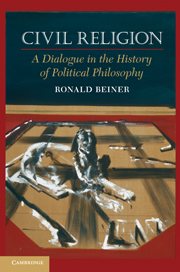Book contents
- Frontmatter
- Contents
- Preface and Acknowledgments
- Introduction
- Part I Machiavelli, Hobbes, Rousseau
- Part II Responses to (and Partial Incorporations of) Civil Religion within the Liberal Tradition
- 9 Baruch Spinoza
- 10 Philosophy and Piety
- 11 Spinoza's Interpretation of the Commonwealth of the Hebrews, and Why Civil Religion Is a Continuing Presence in His Version of Liberalism
- 12 John Locke
- 13 “The Gods of the Philosophers” I
- 14 Bayle's Republic of Atheists
- 15 Montesquieu's Pluralized Civil Religion
- 16 The Straussian Rejection of the Enlightenment as Applied to Bayle and Montesquieu
- 17 “The Gods of the Philosophers” II
- 18 Hume as a Successor to Bayle
- 19 Adam Smith's Sequel to Hume (and Hobbes)
- 20 Christianity as a Civil Religion
- 21 John Stuart Mill's Project to Turn Atheism into a Religion
- 22 Mill's Critics
- 23 John Rawls's Genealogy of Liberalism
- 24 Prosaic Liberalism
- Part III Theocratic Responses to Liberalism
- Part IV Postmodern “Theism”
- Conclusion
- Index
- References
11 - Spinoza's Interpretation of the Commonwealth of the Hebrews, and Why Civil Religion Is a Continuing Presence in His Version of Liberalism
Published online by Cambridge University Press: 05 June 2012
- Frontmatter
- Contents
- Preface and Acknowledgments
- Introduction
- Part I Machiavelli, Hobbes, Rousseau
- Part II Responses to (and Partial Incorporations of) Civil Religion within the Liberal Tradition
- 9 Baruch Spinoza
- 10 Philosophy and Piety
- 11 Spinoza's Interpretation of the Commonwealth of the Hebrews, and Why Civil Religion Is a Continuing Presence in His Version of Liberalism
- 12 John Locke
- 13 “The Gods of the Philosophers” I
- 14 Bayle's Republic of Atheists
- 15 Montesquieu's Pluralized Civil Religion
- 16 The Straussian Rejection of the Enlightenment as Applied to Bayle and Montesquieu
- 17 “The Gods of the Philosophers” II
- 18 Hume as a Successor to Bayle
- 19 Adam Smith's Sequel to Hume (and Hobbes)
- 20 Christianity as a Civil Religion
- 21 John Stuart Mill's Project to Turn Atheism into a Religion
- 22 Mill's Critics
- 23 John Rawls's Genealogy of Liberalism
- 24 Prosaic Liberalism
- Part III Theocratic Responses to Liberalism
- Part IV Postmodern “Theism”
- Conclusion
- Index
- References
Summary
[E]veryone is by absolute natural right the master of his own thoughts.
– Spinoza[W]hat no monarch could achieve by fire and sword, churchmen succeeded in doing by pen alone.
– SpinozaHow far does Spinoza actually go with his liberalism? Starting in chapter 16 of his Theological–Political Treatise, Spinoza tries to answer this question by defining what properly belongs to the judgment of the public magistrate and what belongs to the conscientious judgment of the free individual, and by building up the basic structure of a modern political philosophy. Like Kant more than 100 years later, Spinoza seeks to combine a defense of freedom of thought and expression with an account of obedience to the state.
“[C]onsidered as solely under the dominion of Nature,” human beings operate strictly according to the necessities of appetite, and they are fully within their rights to do so. Just as for Hobbes, though, the imperative to transcend fear and anxiety prompts natural individuals to trade in the unlimited self-seeking of natural right for the moral reciprocity of reason. Nevertheless, reason is an insufficient lever for getting individuals to quit the state of nature and embrace “this highest good, the preservation of the state.” The solution is a contract or covenant, motivated by “hope of greater good or [especially] fear of greater evil,” whereby all natural rights are transferred to the state. With the overwhelming power thereby concentrated in its hands, the state is in a formidable position to enforce compliance, if need be “through fear of the ultimate penalty.” Spinoza departs from Hobbes in calling this “a democracy,” but it is clear that the basic structure of the argument is hugely indebted to Hobbes. Having put together a Leviathan constructed fundamentally on the basis of Hobbesian principles, how does Spinoza then secure a space for liberty and conscientious judgment?
- Type
- Chapter
- Information
- Civil ReligionA Dialogue in the History of Political Philosophy, pp. 121 - 146Publisher: Cambridge University PressPrint publication year: 2010



